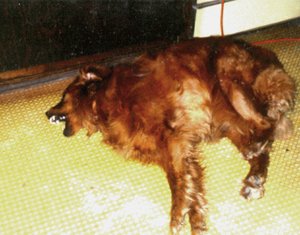Table of Contents
Overview | Causes by Age: Under 6 Months -- 6 Months to 5 Years -- Over 5 Years | Symptoms & Diagnosis | Treatment
Summary:
"Dog seizures can vary in cause by the age of your dog. Seizures can usually be treated with prescription and homeopathic approaches."
Overview
There are two types of canine seizures that can affect your dog's health:
1 - Primary seizures, or idiopathic epilepsy, which means that seizures occur for no known reason
2 - Secondary seizures, which are seizures that occur due to some diagnosed illness or other cause
The likely cause of the seizure is also associated with the age of your dog.
Causes of Seizures in Dogs Under 6 Months of Age
- Epilepsy of the Young Dog (juvenile epilepsy)
- Inflammatory Diseases (distemper, fungal and bacterial diseases)
- Coming in contact with something toxic (spoiled food/dairy products, compost)
- Trauma
- Hypoglycaemia (miniature breeds only)
- Hydrocephalus (abnormal buildup of brain fluid)
- Hepatic Encephalopathy (abnormal brain function due to a problem with the liver)
Causes of Recurrent Seizures in Dogs Aged 6 Months to 5 Years Old
Seizures in dogs within this age bracket are most commonly due to a disease that can be diagnosed with a physical exam and blood test.
- Idiopathic/Genetic Epilepsy (no known cause)
- Inflammatory Diseases: Encephalitis
- Infectious diseases such as viral non-Canine Distemper, Canine Distemper, Bacterial Rickettsial (Ehrlichia and Rocky Mountain Spotted Fever)
- Protozoal Diseases(Neospora, Toxoplasmosis)
- Fungal diseases
- Parasitic diseases
- Non infectious diseases
- Granulomatous meningoencephalomyelitis (GME) which is a progressive, idiopathic, inflammatory disease of the central nervous system (CNS) in dogs
- Immune-mediated diseases
- Idiopathic causes - Thalamocortical Tumors, intra-cranial tumours accompanied by small behavioral changes
Frequent Causes of Recurrent Seizures in Dogs Over 5 Years of Age
- Symptomatic Epilepsy (unknown cause)
- Inflammatory Diseases
- Thalamocortical Tumors (part of the brain)
- Encephalopathy (brain disease with unknown cause such as aging)
- Beta Cell Tumor

Dog Health: Seizure Symptoms
Canine seizures usually have three phases:
- During the first phase, known as
the aura, your dog may seem restless or nervous. He may tremble or
whine. He may wander aimlessly or he may hide. This may last for a few
minutes of for a few hours.
- The middle phase is the seizure itself. During the seizure, sometimes
called an ictus, your dog will lose consciousness. He will probably
fall on his side. His feet may paddle the air. He may vocalize and his
face may twitch. He may empty his bladder or bowels. Though the seizure
may seem to go on forever, most seizures last less than two minutes.
- During the third and final phase, called the post-ictal phase, your dog may appear restless, confused, or unresponsive. He may appear blind and bump into things when moving around the house. This may last for a few minutes or for a few hours.
Diagnosis of Dog Seizures
There are many conditions that can cause your dog to have seizures, including metabolic disorders, liver problems, thyroid disease, central nervous system damage, infections, and genetic disorders. Many of these can be diagnosed by blood tests. Your vet may recommend other tests as well, such as a cerebral spinal fluid test (a test of the fluid that surrounds the brain and spinal column), an EEG, an MRI, or a CT scan. If these tests do not find a cause for your pet's seizures, then your vet will probably make a diagnosis of idiopathic epilepsy.
Dog Health: Treatment of Seizures
Ideally, the cause of the seizure is found and treated, and the seizures stop. However, sometimes no cause is found (idiopathic epilepsy), or if the cause is found and treated, lasting damage may have occurred and seizures may continue.
Phenobarbitol and primidone are the most often prescribed anti-seizure medications. They may initially cause sedation and may also cause your dog to eat and drink more than usual. These side effects will probably wear off as your dog becomes accustomed to the medication.
The object of medication is to decrease the frequency and severity of seizures. It may not be possible to eliminate the seizures altogether.
Home Remedies for Dogs With Seizures
Homeopathic approaches can have a natural calming effect on the central nervous system of your dog resulting in fewer seizures. Herbal drops may be used instead of, or along with, your pet's prescription medication for seizures. It is not recommended that you discontinue your pet's prescription medication without consulting your veterinarian.
A good commercial source for dog seizure homeopathic drops is EaseSure Canine natural remedy for dog seizures.
Sources
The Diagnostic and Therapeutic Approach to Recurrent Seizures in the Dog
Joane Parent, DMV, MVetSc, ACVIM (Neurology)
Ontario Veterinary College
How I Treat Seizures
Anor, S.
